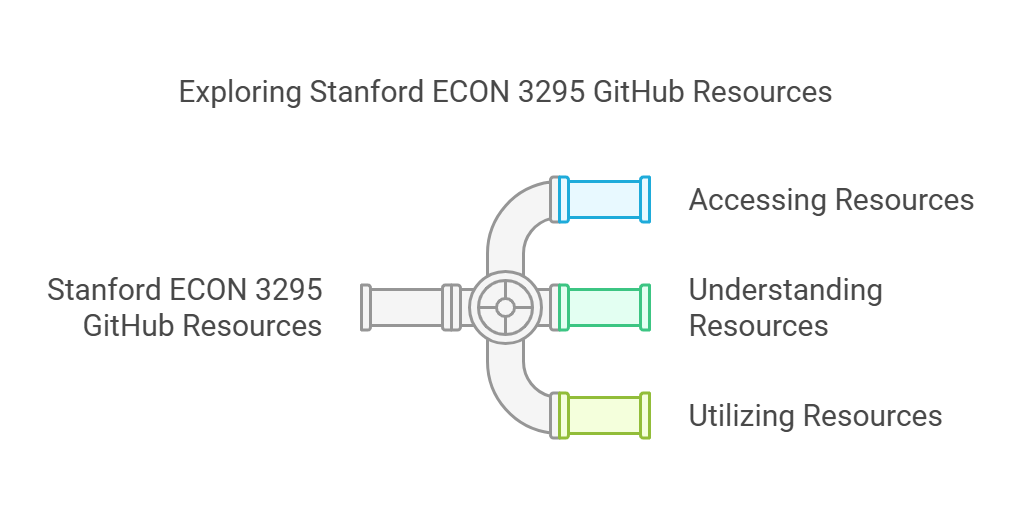Discover how to unlock amazing resources for Stanford ECON 3295 on GitHub. Access essential materials and boost your learning with our step-by-step guide.
If you’re an economics enthusiast or a student looking to dive deeper into advanced economic concepts, you’ve probably come across “Stanford ECON 3295.” This course is highly reputed for its innovative approach to economic theory and practical applications. The good news is that many resources for this course are shared on GitHub, offering a treasure trove of learning material. Here’s a comprehensive guide on how to access, understand, and make the most of Stanford ECON 3295 resources on GitHub.
Why GitHub for Stanford ECON 3295?
GitHub is widely used by educators and researchers to share course materials, datasets, and code repositories. For Stanford ECON 3295, GitHub acts as a centralized hub where students and learners can access:
- Lecture Notes: Detailed insights into economic theories.
- Problem Sets and Solutions: Practice materials to solidify understanding.
- Research Papers and Datasets: For those delving into empirical economics.
- Code Examples: Practical applications of economic models using programming languages like Python or R.
By leveraging GitHub, the course ensures accessibility, collaboration, and version control, making it easier for students worldwide to benefit from its resources.
How to Download Themes from GitHub
Step-by-Step Guide to Accessing Stanford ECON 3295 GitHub Repository
- Search for the Repository: Open your browser and search for “Stanford ECON 3295 GitHub” on a search engine. Look for a link leading to the GitHub repository, often hosted under a university or professor’s account.
- Navigate the Repository: Once on the repository’s main page, familiarize yourself with its structure. Key sections include:
- README File: This is your starting point, providing an overview of the repository.
- Folders: Organized by weeks, topics, or types of resources.
- Files: PDFs, scripts, and datasets available for download.
- Clone or Download: To use the resources offline, you can clone the repository using Git or download it as a ZIP file. Here’s how:
- Cloning:
git clone <repository-url>
4.Downloading: Click on the green “Code” button and select “Download ZIP.”
Install Dependencies: If the repository includes code, check the requirements.txt or environment.yml file to install necessary dependencies. Use Python’s pip or Conda to set up the environment:
pip install -r requirements.txt
Engage with the Community: GitHub repositories often have an Issues or Discussions section. Use this to ask questions, provide feedback, or contribute to the repository.
Maximizing Learning from Stanford ECON 3295 GitHub Resources
- Study the Lecture Notes: Start by reading through the lecture notes to grasp theoretical concepts.
- Practice with Problem Sets: Solve the exercises provided and compare your solutions with the answer keys.
- Analyze Datasets: Use the datasets to replicate research findings or conduct your analyses.
- Experiment with Code: If the repository includes code, run it on your machine. Modify parameters to understand its functionality better.
- Collaborate and Contribute: GitHub allows you to contribute to repositories. Fix a typo, optimize code, or add documentation to make the resource better for others.
Best Practices for Using GitHub for Learning
-
- Version Control: Learn Git commands to track changes and revert if needed.
- Forking and Pull Requests: If you wish to make significant contributions, fork the repository, make your edits, and submit a pull request.
- Documentation: Always refer to the documentation within the repository for detailed guidance.
- Stay Updated: Repositories may update over time. Use Git commands like
git pullto fetch the latest changes

FAQs
- What is Stanford ECON 3295? Stanford ECON 3295 is an advanced economics course focusing on cutting-edge research and practical applications in economic theory and data analysis.
- Why is GitHub used for course resources? GitHub provides easy access, collaboration, and version control, making it ideal for sharing and maintaining educational materials.
- Do I need programming knowledge to use these resources? Basic knowledge of programming, especially Python or R, is recommended for utilizing the code examples effectively.
- Can I contribute to the Stanford ECON 3295 GitHub repository? Yes, many repositories welcome contributions. You can fork the repository, make edits, and submit a pull request.
- Are these resources free to use? Most GitHub repositories for educational purposes are open-source and free to use, but always check the licensing terms specified in the repository.


